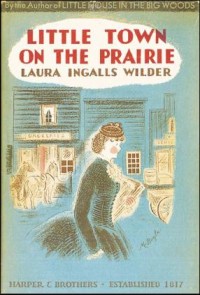The wind had a desolate sound

Little Town on the Prairie
by Laura Ingalls Wilder
I read a couple of other books in-between, but now I’m back with the Little House series. Not many left to go now. This is book 7 in the series, so this review may contain spoilers for the previous titles.
I have mixed feelings on this one. After three great books in a row, this one just didn’t maintain the standard. I mean, obviously I am now hooked and want to find out how things turn out for everyone, so I’ll keep reading the series, but there was something missing here.
This book follows on from the terrible winter of 1880–1881 and shows the Ingalls family finally back on their feet, getting the land producing and getting used to the town of De Smet as well. Certainly, plenty of things happen – Mary finally leaves for the blind college in Iowa, Laura has some trouble with a teacher at school, Carrie has some health troubles, Almanzo Wilder starts showing an interest in Laura, though she doesn’t seem to have figured out why yet – but I suppose after the genuine fear-for-their-lives stuff of the last few books – a plague of locusts! wild fires, wild gangs of men, seven long months of blizzards – it all feels a bit tame.
Pa is becoming a bit of a town elder. And Ma now has a church social group, though she doesn’t like the priest. Until the last few pages of the book, it’s all got very settled, but I’m not even sure that’s what bothered me. Several times, there would be a major plotline about something negative, and then with the very beginnings of a possible solution, the subject wouldn’t be mentioned again.
It’s not that I disliked this book. It still had charm and great characters. I guess now the family’s settled there’s not a lot of historical stuff here for me to learn, but there are still anecdotes that stuck with me enough that I found myself recounting them to people who ask me about my reading.
“The wind had a desolate sound. The sun was small and the sky was empty of birds. On the endless dull prairie the grasses lay worn-out and dead. The schoolhouse looked old and gray.”
First published 1941.
Source: Google Books.
I’m sure I read this years ago but looks like I might have to revisit it sometime again.